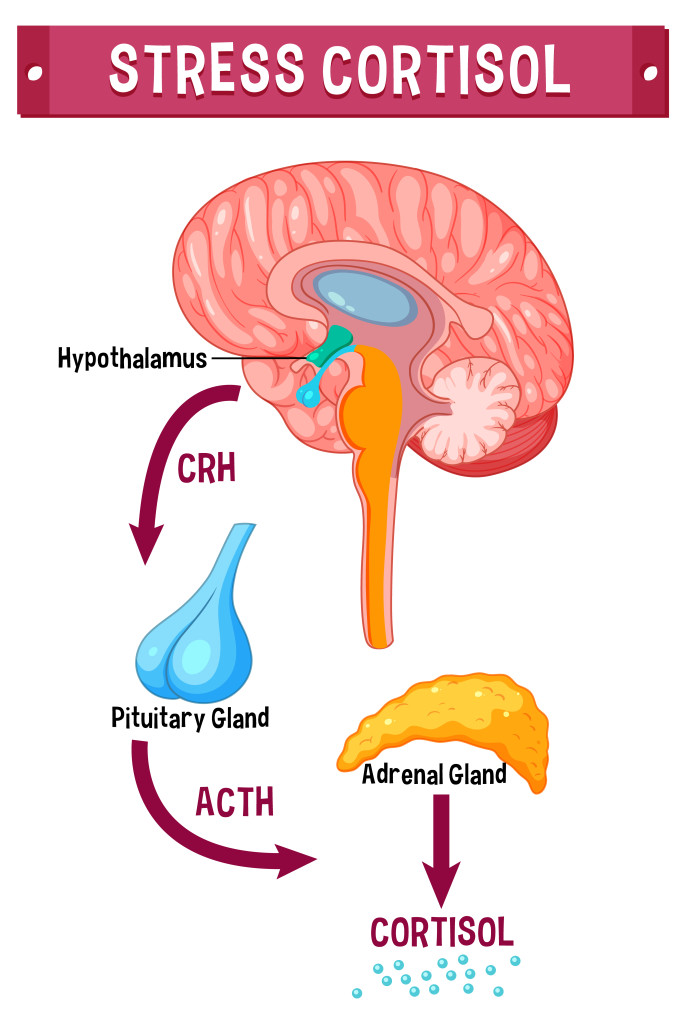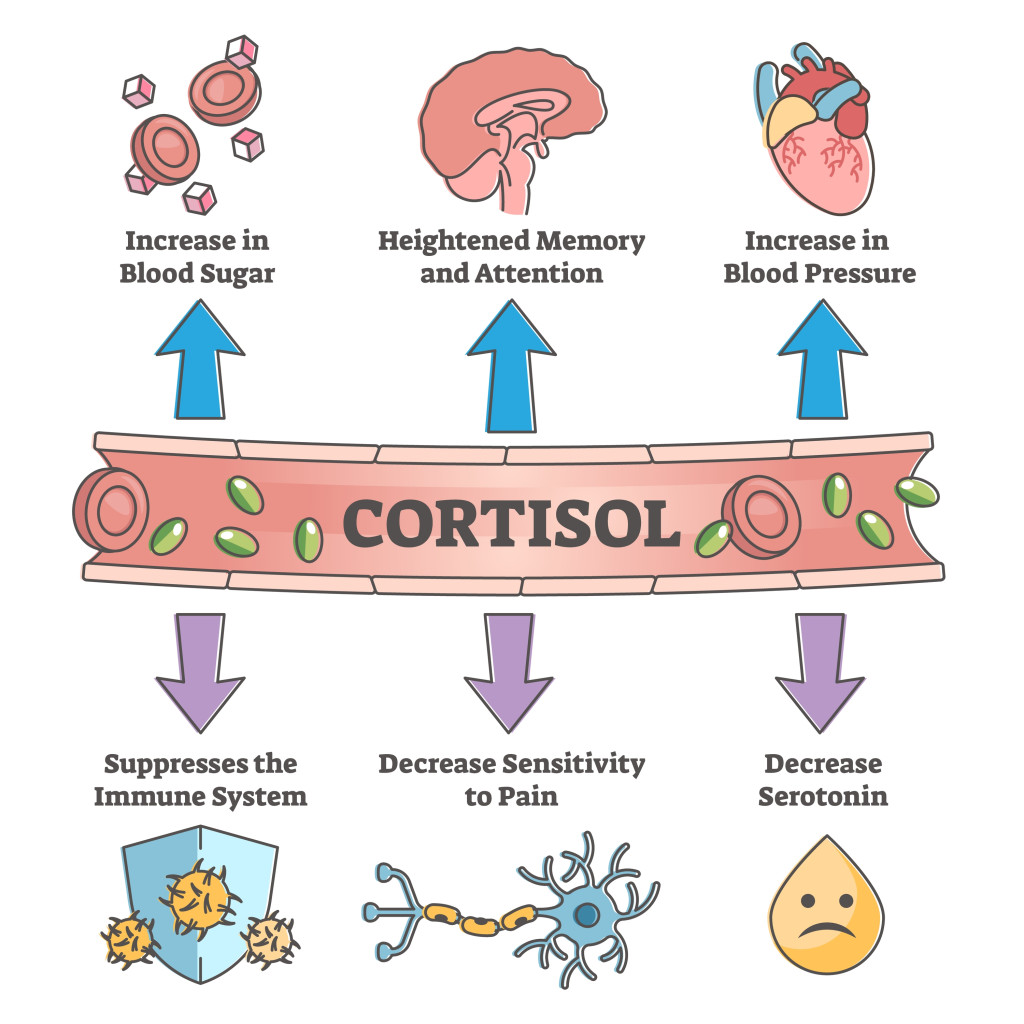Table of Contents (click to expand)
- What Is Stress?
- How Does The Body Respond To Stress?
- Myths, Fact Or Fiction?
- Myth 1: Cortisol Is A Steroid, And Therefore Must Be Bad For Us.
- Myth 2: A Blood Test For Cortisol Can Tell Me If I Am Stressed.
- Myth 3: Cortisol Is Only A Hormone To Battle Stress.
- Myth 4: Stress Affects Your Memory Vis-a-vis Cortisol
- Myth 5: Stress Causes Weight Gain Via Excess Cortisol Levels
- The Final Pill
Our environment, as well as our physical and mental state of being, all act in sync to combat any stress we face. Everyone experiences stress differently, so their body responds to it differently too!
Ever felt stressed at work or school and tried to find ways to deal with it? Since everyone has quite a bit to say about stress these days, there is a lot of information out there. And just like a game of Telephone, this has led to all sorts of myths about it.

Here at ScienceABC, we’ve watched this unfold and have decided to do something about it. Here’s some helpful information on stress, along with some common myths about it broken down into fact or fiction. But first…
What Is Stress?
The World Health Organisation (WHO) defines stress as a state of worry or mental tension caused by a difficult situation. Everyone faces some amount of stress in their lives. The difference is the way each person and their body responds to it.
How Does The Body Respond To Stress?
The human body responds to stress by activating some major internal systems, namely the immune, nervous, and endocrine (aka hormonal) systems. The kingpin of stress among these systems is a hormone called cortisol, which comes from the endocrine system. Most of the myths around stress are also built around this key hormone, but why is it so special?

The endocrine system responds to stress via the Hypothalamic-Pituitary-Adrenal Axis (HPA). Read here to find out more about this critical conjunction. This axis of organs essentially secretes cortisol, which is commonly known as the ‘stress hormone’.
Cortisol is a steroid hormone synthesized from cholesterol in the adrenal gland. It has many bodily functions, including responding to stress, regulating metabolism, managing immune functions, and executing inflammatory responses. However, like everything else in the universe, striking a balance is important. Any imbalance in the body’s response to stress, including but not limited to cortisol, can result in damage and disease. Hence, some of the scarier myths about cortisol and stress in general.
So… let’s get to these pesky myths then!
Also Read: What Is The ‘Master Gland’ In Our Body?
Myths, Fact Or Fiction?
Myth 1: Cortisol Is A Steroid, And Therefore Must Be Bad For Us.
Fact or fiction?
Cortisol is a steroid. Fact.
Are steroids bad for us? Fiction.
Why?
Cortisol is indeed a steroid (aka glucocorticoid) that is naturally produced by the adrenal glands within the body. Cortisol has many functions necessary for survival, but just like cortisol, there are other glucocorticoids or steroids like oxytocin, testosterone, progesterone and others, all of which are also necessary for survival. Natural steroids produced within the body are not harmful to us.
However, synthetic forms of these steroids are commonly misused for various reasons. This can lead to a plethora of serious side effects, both physiological and mental, resulting in addiction. This is why using such drugs without a prescription for a diagnosed medical illness is illegal.
Myth 2: A Blood Test For Cortisol Can Tell Me If I Am Stressed.
Fact or fiction?
Fiction
Why?
Cortisol secretion in the body isn’t like a light switch, it doesn’t just turn on and off. Cortisol levels fluctuate within minutes. This is important for its function of adaptation to different stressful stimuli. Also, there is a diurnal variation in cortisol. It rises in the morning to wake us up, and at the end of the day, it reaches a low point, signaling us to go to bed.
Studies have shown that if you suffer from depression, or sleep deprivation, or work shift changes, your cortisol levels will show a flat diurnal variation. Thus, a one-time measurement of cortisol will not tell you much of anything.
One common way to measure cortisol levels is to collect urine throughout the day to check if cortisol secretion is fluctuating properly. An easier way is to measure the cortisol levels from a few hairs on your forehead. This can indicate the levels of cortisol across multiple days from a single sample. Another simple way is to check the cortisol levels in the saliva before and after a stressful event. If there is no rise in cortisol after the stress, it indicates an improper response of the body to stress.
Also Read: How A Few Simple Tricks Help You Pass A Lie-Detector Test?
Myth 3: Cortisol Is Only A Hormone To Battle Stress.
Fact or fiction?
Fiction.

Why?
Yes, a major function of cortisol is to activate the immune system in response to acute stress so that it can fight off a pathogen, or aid in wound healing. Besides that, cortisol fluctuations help in forming and removing synapses in the brain, which is how it learns and adapts. It controls how our body uses fats, proteins, and carbohydrates for energy. It also regulates and increases blood pressure when required, and regulates our blood sugar, along with insulin.
Myth 4: Stress Affects Your Memory Vis-a-vis Cortisol
Fact or fiction?
Fact
How?
Under conditions of acute stress, cortisol and another stress hormone, adrenaline, act together to promote synapse formation in the brain to improve memory. The memory will be of the particular event that caused you stress. This will come in handy to help you avoid that particular stressor in the future.
However, we all face some stressors that we just can’t avoid, so the stress persists. In such a case, the excess of hormones being secreted will result in removing the synapses created and forming new ones that may associate with fear or adaptation. This explains how we eventually get used to a particular kind of stress if we continually expose ourselves to it.
Also Read: Why Do Bad Memories Last Longer?
Myth 5: Stress Causes Weight Gain Via Excess Cortisol Levels
Fact or fiction?
Fact
How?
Stress-induced cortisol secretion is tightly regulated with metabolism and blood sugar control via insulin. Thus, in cases of chronic stress, there is significant evidence of a correlation with weight gain. A large population-based study on 2,526 men and women measured hair cortisol levels and correlated that variable with instances of obesity. The study showed that chronic levels of stress were positively correlated with obesity.

The reason for this weight gain is quite intuitive. Have you ever felt like shoveling down a bucket of ice cream or devouring a full pizza after a long hard day? Science calls this the ‘Comfort food hypothesis’.
When you undergo chronic levels of stress, your body responds to it in several ways:
- The HPA axis secretes cortisol at higher levels. Since cortisol controls insulin levels, your blood sugar drops. This makes you crave sweet or calorie-rich foods.
- Higher cortisol levels activate a certain part of your brain, the amygdala, commonly known as the emotional brain. This makes you engage in pleasurable or compulsive activities, and binging on junk food is a common guilty pleasure for most people.
Ultimately, the elevated cortisol drives these fat deposits to accumulate in the abdomen, resulting in abdominal weight gain.
Also Read: Why Do Some People Not Feel Hungry When They’re Stressed?
The Final Pill
Also Read: Stressed Cells: What Is Cellular Stress?
When it comes to stress and dealing with its many sources, there are no fixed rules. Our environment, as well as our physical and mental state of being, all act in sync to combat the various forms of stress we face. Everyone experiences stress differently, and their bodies respond to it differently too. However, openly communicating about our stress remains a tried and tested way to deal with it. In other words, if you’re having a hard day, try talking about it before you do anything else.
How well do you understand the article above!

References (click to expand)
- McEwen, B. S. (2019, January). What Is the Confusion With Cortisol?. Chronic Stress. SAGE Publications.
- Peters, A., Reisch, C., & Langemann, D. (2018, January). LTP or LTD? Modeling the Influence of Stress on Synaptic Plasticity. eneuro. Society for Neuroscience.
- Jackson, S. E., Kirschbaum, C., & Steptoe, A. (2017). Hair cortisol and adiposity in a population‐based sample of 2,527 men and women aged 54 to 87 years. Obesity, 25(3), 539-544.
- MF Dallman. (2005) Chronic stress and comfort foods: self-medication .... ScienceDirect
